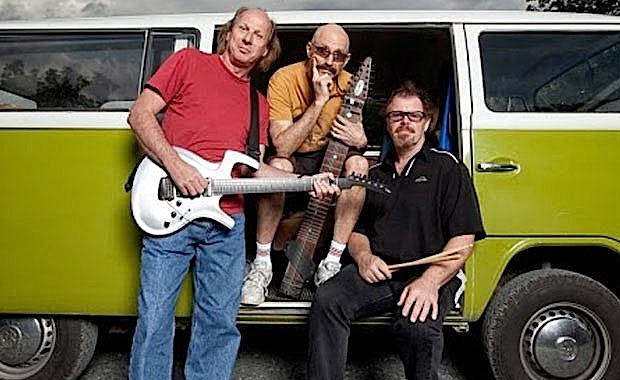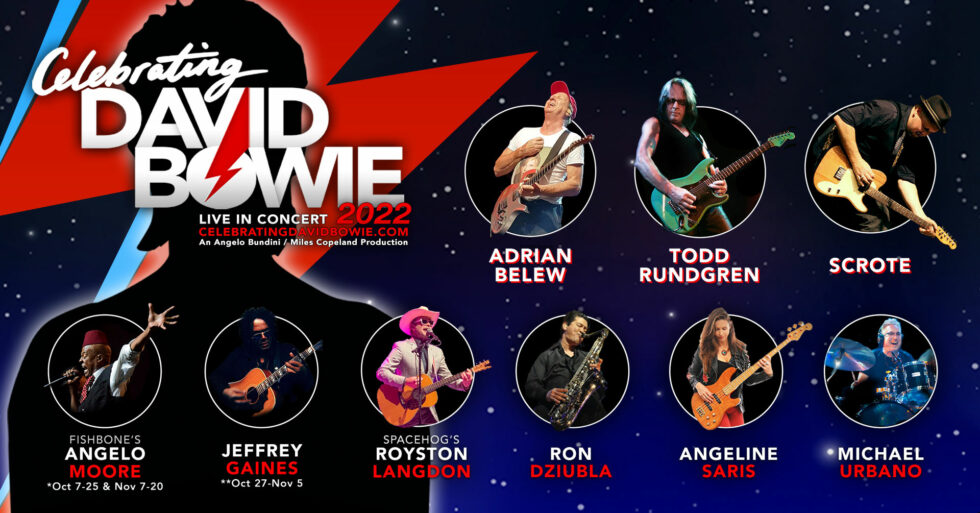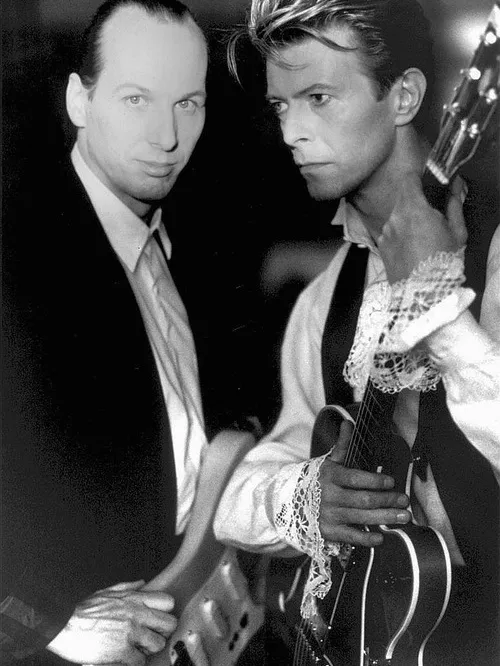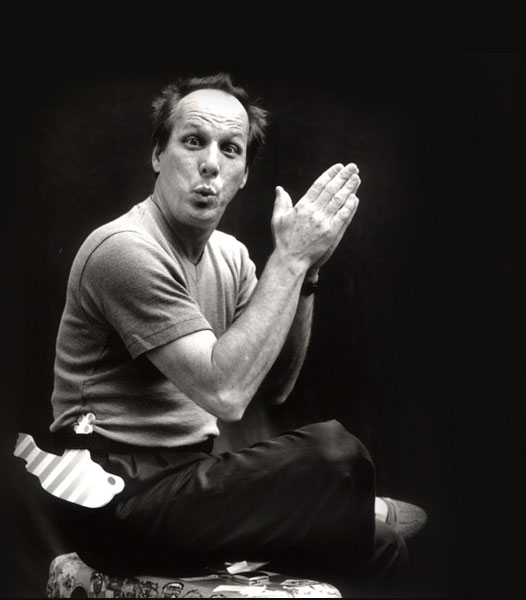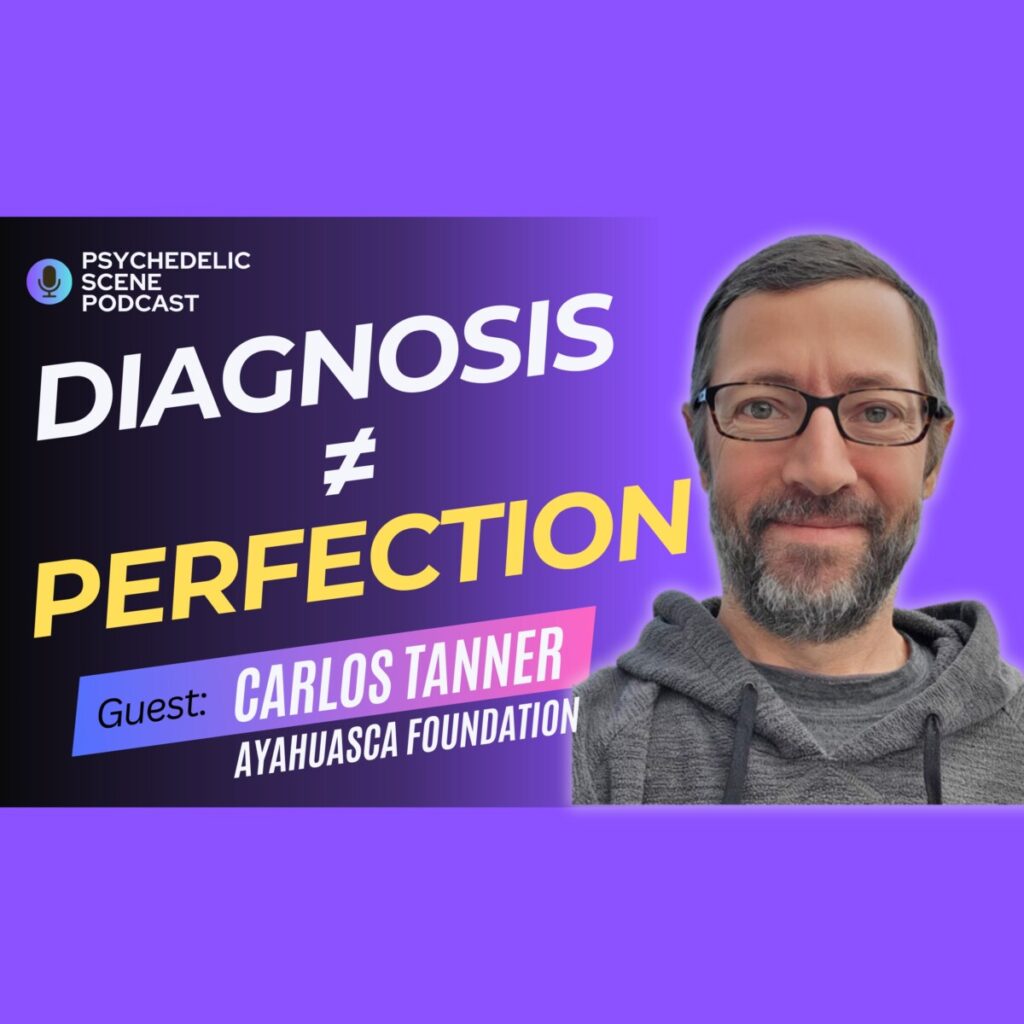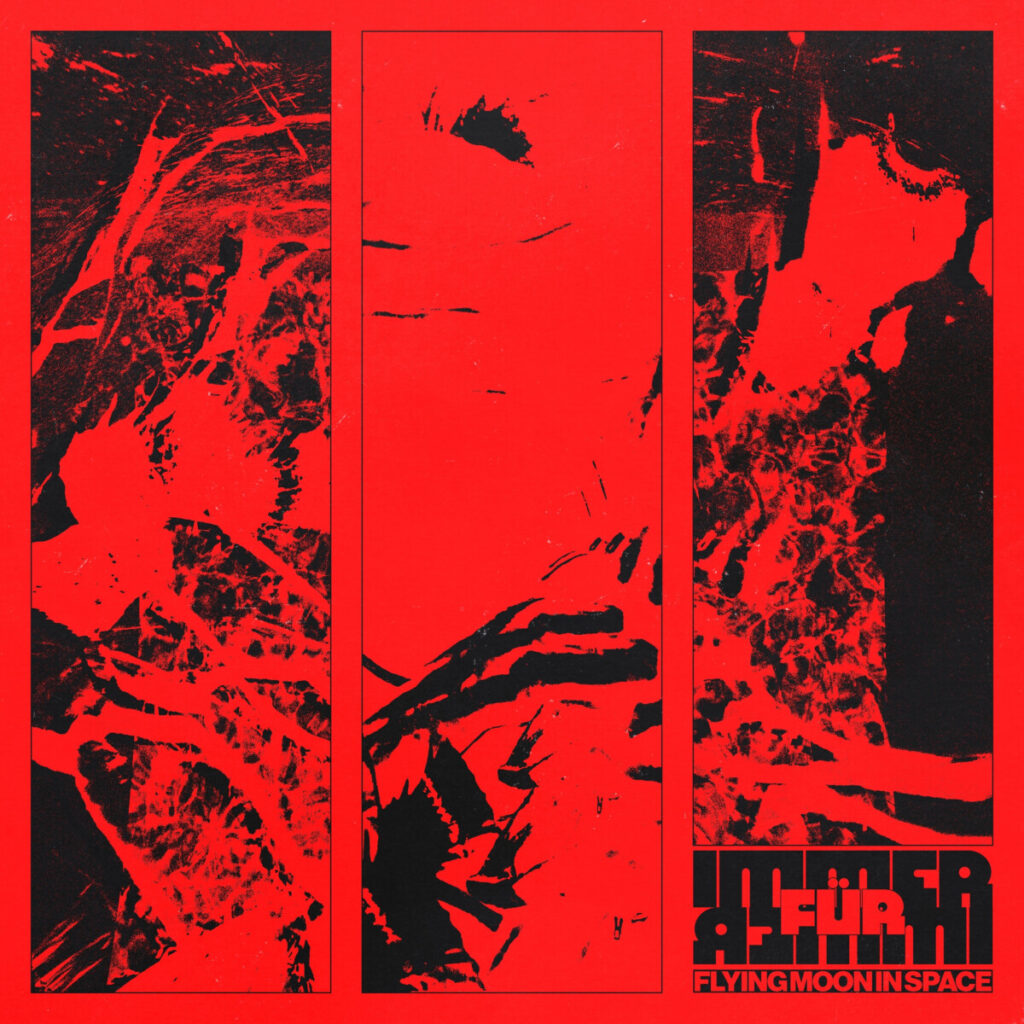Interview: Adrian Belew
Interview: Adrian Belew
Mark Johnson of Psychedelic Scene:
Hello, Adrian Belew.
Adrian Belew:
Hey, how are you doing?
Mark:
I’m great. Hey, great to meet you. Thanks for being here here.
Belew:
My pleasure. Thank you.
Mark:
Yeah. So I guess we have a little bit of time. I’m really excited for your tour, coming to Tucson. Looking forward to that.
Belew:
Yeah, me too. It’s rare that I get to Tucson. Yeah, that’ll be fun.
Johnson:
Yeah. Are you already on the tour?
Mark:
No, I leave in four days, but the first thing I do when I leave is go play the Wiltern Theater in L.A. with the Talking Heads and Jerry Harrison. Jerry Harrison and I go up to San Francisco and do a big festival there called Strictly Hardly. Then that’s over with. And then I go back to L.A. and begin rehearsals for two days with celebrating David Bowie, and then we leave.
The first thing I do when I leave is go play the Wiltern Theater in L.A. with the Talking Heads and Jerry Harrison.
Mark:
Okay, wonderful. Yeah. And I guess you’ll be here right near the end of the tour. You’ll be all warmed up by then.
Belew:
We should be in very fine shape by then.
Mark:
Oh, very good.
Belew:
I’m still cramming myself here. I’m still in my studio cramming last minute, like, oh, my gosh, there’s a lot to learn.
Mark:
Yeah. And it’s not necessarily the songs that you played with David Bowie in ’78, I gather.
Belew:
Well, some of it is, some of it isn’t. And then I did the 1990 tour, so there’s some of that, too, like “Pretty Pink Rose”, which we had just done at that point, so yeah, it’s just some of the older stuff, like Station to Station we’re doing this time. I haven’t done that since 1979.
Mark:
Oh, wow. Yeah. I was thrilled that Station to Station showed up a little bit in the Moon Age Daydream movie that just came out.
Belew:
Yeah. I’m going to see that either tomorrow night or the next night. I hate to go on a Friday, but I think my wife wants to go on a Friday. She can’t wait to see me be 40 feet tall.
Mark:
Very good. Well, it’s a beautiful movie. I’m sure you’ll enjoy it.
Belew:
Yeah. The director is waiting for my response. He’s asked me to let him know what I thought of it, so I can’t wait to see it. I’m sure it’s going to be great.
Mark:
Yeah, I think you would like it.
Belew:
That’s all that matters then, right now.
Mark:
I saw that you played with Nine Inch Nails as well. Was that in ’94?
Belew:
Well, the first record, I’ve done four of them. The first record was The Downward Spiral. The second one is Fragile, and then I did the next two after that, so I don’t know what year Downward Spiral is right off the top of my head.
courtesy of Adrian Belew
Mark:
Very good. I saw a video where David Bowie was singing “Hurt” with Trent Reznor, and I think you were there on stage.
Belew:
No, I wasn’t on stage for that, but when Trent Reznor called me, one of the things he said was… He laughed and said, “I never thought you would come and play with us because we’re such fans of what you did with Bowie”. So that was really why he invited me to his party.
Mark:
Okay. Right on. I wonder how it compares– playing for Frank Zappa versus the Talking Heads versus David Bowie. Do you have a favorite? What do you like about playing with them?
Belew:
Well, no, I like all of them. I don’t really have favorites. I think Frank was very important because he discovered me and Frank was kind of a mentor to me. I never had had any lessons of any sort. I figured everything out myself, all the way up to there. He taught me how to play in odd time signatures and other musical things. But more importantly, my year with Frank, I stuck to him like Velcro. He just was always he’s telling me things about how to be a world class recording artist and touring musician and how to make records, how to have your own business, a lot of very important stuff. So then when I went next to David, it was different because David really just needed me to be as wild on guitar as I wanted to be, and he just let me go free. Whereas with Frank, everything was pretty much decided beforehand. You’re supposed to just memorize it, in my case, but most of the musicians, all the other musicians would just read it. But anyway, you were supposed to play it consistently and correctly and be on time. Do not be doing drugs or with a hangover or anything. With David, it was pretty much just, “Okay, I want you to go crazy on guitar. I love what you’re doing on guitar. Just go as far out as you want”. And that sort of bled over into the Talking Heads because they needed exactly the same thing.
David really just needed me to be as wild on guitar as I wanted to be, and he just let me go free. Whereas with Frank, everything was pretty much decided beforehand.
In Frank’s band, an important part of the singing role was mine because I was singing things when he was playing. He couldn’t play and sing at the same time with both of the Davids: David Bowie and David Byrne, obviously they were the singers, so I would do harmonies and things. But that wasn’t so much my role until I got into King Crimson, which was the next thing that happened. And then at King Crimson time, I was finally given the keys to do all the things I had been waiting to do. I was the front man, the singer, the songwriter, the lyricist and the guitarist with Robert Fripp. So I got, you know, lots of things to catch up with all at once there. That was pretty high pressure.
Mark:
Yeah, King Crimson as well. And yeah, you did really seem to kind of carry most of Discipline, it seems.
Belew:
Well, Discipline originally. I mean, when we started writing, it was all built around the gamelan double style guitar things that Robert and I played, the interlocking guitar stuff, that kind of stuff. And the real problem for me at first was, okay, I’m supposed to turn this now into songs. And that was hard to imagine doing. But then I finally broke through and started writing things like “Frame by Frame” and other things like that. And so finally I felt like, okay, now I got this. And then it was just making a lot of time to write lyrics in that particular band because you had to be sure you weren’t going to embarrass the other guys.
Mark:
And you have a bunch of solo material as well, and some other art forms, too. What are you working on these days?
Belew:
Well, I just finished my own tour of 26 cities with my trio that I’ve had forever and ever. My bass player has been with me for 16 years. I just put out my 25th solo record, so that’s quite an achievement. 25 solo records and I had already started on the next one, and I’ve got seven songs in the making. A couple of them are finished, but the rest of them I’m not going to be able to finish until the end of the year. So that’s what I’m doing. The rest of my year is this: the two Talking Heads dates and 30 David Bowie dates. And then from December on into the next year, I’ll be working on my next record and we’ll get back to touring with my trio. Because the trio didn’t get to do… 26 dates is not that many dates for us. We go all over the place. In fact, we usually go around the world, so we have a lot of stuff still left to do to get back where we were before Covid.
Mark:
Yeah, I saw you play with your band in San Francisco at The Chapel just before the pandemic.
Belew:
Oh, wow. Yeah, I love The Chapel. Those are good shows.
courtesy of Adrian Belew
Mark:
Yeah. That was nice. And it’s good to see you playing your solo material and you played a little King Crimson and some other stuff. Be really nice to see you working on David Bowie’s catalogue. I wonder, do you look forward to songs or are some songs really fun to play?
Belew:
Yeah, sure. There are a lot of songs in there that I really love and really look forward to playing with the band. It’s not someone always on the stage, so I play probably about half of the songs. So it’s based on, well, this is a song I feel like I should be able to do this in or I could sing this one. So I think I sing a half a dozen songs or maybe more. And the rest of them I’ll play and do harmonizing with Todd Rundgren or Angelo Moore or someone else. There are six singers in the band, so we’re able to move the whole stage around a bit. It’s not just full-on band all the time. It switches around. And so that’s nice because then you get a lot of different interpretations of David Bowie’s music and his style. No one’s trying to be David Bowie.
Mark:
Yes.
Belew:
This is the third one of these I’ve done and every time it’s been a different line-up. There’s a core set of people, the four of us: Ron Dziubla, who is the saxophonist, Angelo Moore, who is an incredible performer and singer and plays a lot of different things, Scrote, who is the producer and guitarist, and myself. But every one of these three tours we have added different players based on the players themselves, their availability, and the material that we wanted to do. So Scrote produces the show so he’s got the idea of how he wants it to go and then we find the right people to do that. And then, of course, the other interesting thing is when we go to some cities we’re able to pick up other guest stars. Like last time when we played at the Wiltern Theater for two nights, Sting came and sang a couple of David Bowie songs from his last record. And we get that kind of stuff all over the place. So it’ll be interesting to see what happens with that. Right now, I’ve asked my friend Billy Bob Thornton to come and sing a song with us in Beverly Hills at the Saban Theater.
So I think it’s interesting to see what Todd Rundgren will do with David Bowie.
I hope that works out. But you also get that kind of thing. There’s a lot of shaking up going on. We have Thomas Dolby, I think, is coming in and doing the show with us for two shows in, I believe, around the East Coast, Connecticut area. That’s kind of where he lives. So sometimes we even have an orchestra. Depends. Before this tour, we only ever played a handful of dates at a time. We do major cities, we’d do Tokyo, we go to Australia, play the Sydney Opera House for two nights. And we do New York and London and maybe L.A. and that would be it. This time, this is an actual daily, daily tour from one place to another, 30 days. So 15 people in a bus. So this is a different affair. We’re bringing our own light system and things like that. It’ll be a full on production rather than us flying into one city and doing that five times and saying goodbye for a year or two.
Mark:
Very good. Sounds like a lot of fun.
Belew:
I think it will be a lot of fun, yeah. Everybody’s very highly professional and the right people for these shows. We try to bring in people who had some relationship to David or people at least, who are highly, very good at his music. Like, we had a singer from Australia that was really great, David Bowie singer, Paul. And he won’t be on this one, but he was on the first two. And now we’ve got Todd Rundgren. So I think it’s interesting to see what Todd Rundgren will do with David Bowie. We did play two shows together with Todd. The last thing we did in 2018, the last thing was we flew to Reykjavik, Iceland, and we did two concerts in a beautiful concert hall there with their orchestra. And Todd did those shows with us. So we’ve already played with him and that’s what got him interested in continuing.
Mark:
Wonderful. Well, Adrian Belew, you are known as one of the most distinctive guitar sounds back from doing guitar tricks with Frank Zappa. I’m curious about guitar stuff and where you are with that. I don’t know. I have a friend who is wondering what’s your favorite guitar pedal or sound effect?
Belew:
Well, there’s so many. I have everything I’ve ever had as well as everything that’s been recent and new. So it’s hard to pick one pedal for me, What I have done is, for this particular tour and the Talking Heads tour dates, which were festivals, I went back to a simpler setup of the setup I was already using, which was a Midi guitar set up. A bit complicated. It even involved my laptop. And to make it simpler, because in those festivals you have no time whatsoever to get your gear on stage and play. I’ve gone to a simpler setup and I’ve incorporated my Stratocasters. Now, Fender Custom Shop has built me three new Stratocasters, so I’ll be using those. And in fact, next year, I believe around March, they’re going to put out a custom shop Adrian Belew model, limited edition. So that’ll be nice. I try to travel as light as I can now, but I am able to pretty much do most of the things I could do before. If you want a rhinoceros or elephant or seagull or any of that crazy stuff, I’ve still got that in my back pocket. And there are a few things to get lost in the shuffle over the years because you change gears so many times, change from one set up to another, you lose something in that deal, but you also hopefully gain more because technology has gotten smaller and better. For decades now, I’ve watched it grow. I’ve been a part of that.
Mark:
Still playing your Parker? Are you traveling with that as well?
Belew:
Well, when I do the Midi set up, that’s when I use the Parker. So this last store that I did with my band, the Power Trio, I used Parker’s because that is music that was written with the Midi rigs that I’ve used. And so in order to do that music correctly, I do still need to do that. But as I’m saying, for the Bowie show, I didn’t have any of that or the Talking Heads show. So I can just go back to something. I mean, I’m not going to try to play and sound exactly like I did then. It would really be hard to do. Impossible perhaps, but I’m going to play things like that, but with what I have now. The other thing about it is, of course I can play things now that I couldn’t play back then.
Mark:
Yeah. I wonder where your playing style is going up. Before I forget, your Fender signature guitar, did they ask you for features that you would like to see in the guitar?
Belew:
Oh, yeah. I flew out to a Fender and we designed it together. You get to pick everything and it was a wonderful time. The guy who built it is the head of the custom shop. Ron Thorne is his name, he’s built a lot of great guitars for artists and he’s been waiting for years to do something with me. He’s a big fan. So we designed something that’s I think really perfect. So it’s not a Parker Fly, it’s a different thing. Parker Flies. There’s nothing else like them.
Mark:
Yeah, very good. And where are you with your– I wonder what does guitar practice look like for you?
Belew:
Well, I really don’t practice so much because I play so much. What I’m going through now is just memorizing the songs, the arrangements, the vocals, the lyrics, and fine tuning my guitar programs so I have everything. And today there’s a friend of mine coming over who works for me sometimes and we are going to put all the guitar sounds correctly into the set list. In my Midi, I do have a Midi controller, but you don’t have to have a Midi guitar to use that. And so it just controls the programs that I use in the Axe FX. So you can go now. Okay. Here’s, “Heroes”. Here’s the sounds I use for that.
Here’s “Ashes to Ashes”. Here’s the sounds for that and so on. And I’ll have them in order before I go on stage.
Mark:
Yeah, all good.
Belew:
Are you a guitar player?
Mark:
I do play, yeah.
Belew:
You probably know all this stuff. It’s no secret. I mean, most people have to do that nowadays and it’s good. It’s made it a lot more convenient than stepping on a bunch of different pedals, which some people still do that and that’s a good way too.
Mark:
Yeah, that’s where I am– just pedals and a set list. Have to figure it out. Definitely ways to organize it when you take it to the next level.
Belew:
Well, yeah. When you’re playing out there in front of the size audiences we play for in the places we play, you don’t want to have to do a lot of thinking about the pedals dancing around on them. There’s a bit of an art to that to me, too, because I’ve got so many things going on with my feet while I’m playing. People shouldn’t even notice. But that’s the idea that you do it so flawlessly that no one realizes you got your own little ballet going on.
Mark:
Yeah. Sometimes it involves a looper for you. Is that right?
Belew:
In my shows, yes. Not for the Bowie shows. Once again, there were no loopers then, so there’s no reason for me to loop. We have several guitar players and several keyboard players, so there’s plenty of people to play the parts. But in my show, I do a lot of looping. Oh, my gosh. That’s why I have a trio, because I figured if I do the way I do looping now, it’s like having another guitar player. So it’s like a four-piece band with only three people.
Mark:
Yeah. Pretty amazing what you can do with loopers.
Belew:
Well, I’ve written a lot of material with and that’s another thing you can do with loopers that I think is amazing. I mean, I’ve written whole songs around something that I loop and then find something else to play over top of it. Then you’ve got two completely different parts. You’re on your way.
Mark:
Yeah. Two or more, I guess.
Belew:
Yeah, or more. When I wrote this thing called E, that’s the record that I did with The Power Trio. It’s a 43-minute piece of music in five sections, and I make 16 loops during that 43 minutes. They have to be perfectly right every time. So it’s a good thing I have a drumming background. My timing is very good.
Mark:
That’s right. A drummer before a guitarist.
Belew:
Yeah. You hear the new record Elevator, like most of my records, you’ll see that I play and do everything on it, including even the artwork, and people are commenting that my drumming is getting better. Well, I actually had time to practice for once with the Covid lockdown. I could sit down, practice what I wanted to play, get it right, curate the songs, and make sure this record, I think my new record is one of the best I’ve made. I’m really pleased with it, and it has my digital paintings that I now do that I taught myself to do– digital painting during the Covid drought as well. And so I think it’s a very good package. So don’t hesitate to mention that you can buy that on AdrianBelew.net or at Bandcamp because there’s still a lot of people catching up. But my fans are really over the moon for Elevator. I tried to make it an uplifting record to follow on the downtime of the Covid for everyone. I wanted to make a record that everyone would make them feel good, which is kind of how I feel Remain in Light is. It’s a feel good kind of record.
Mark:
Very good. And AdrianBelew.net, you can find that music there. Very good.
Belew:
Well, yeah, you can find all the music. All the records are there. We’re still kind of rebuilding the website. We started that recently, too, because we knew there was going to be a lot of traffic. Now, the other thing I like is when people come to the Facebook page. I have a very good relationship with the fans on Facebook. I actually answer things, I enjoy it, and I post a lot of interesting things. Pictures of guitars or whatever. That seems to be the right thing to do. I’ll post about my thoughts about Moonage Daydream as soon as I’ve seen it, for example.
Mark:
Very good. Yeah. Won’t spoil it. Really worth seeing. Really beautiful creative effort. So for Psychedelic Scene, where we’re going to publish this, I wonder if you have thoughts about psychedelia. I wonder if you consider David Bowie’s work psychedelia or certain parts of it?
Belew:
Well, psychedelia is a particular style of art, and I do see that in some of his work. But overall, I’ve always considered David to be one of the few most artistically creative musicians, artists that we have out there. And I was always amazed at how he could take some things that would be considered off the wall and still make them popular. And his feel for actual art, as well as fashion and so many other things, staging, lighting, all those things are what makes him David Bowie. So, yeah, he’s got his own psychedelia.
courtesy of Adrian Belew
Mark:
Yeah, he was really aware of perception, which is a big part of it, I guess. And then identity as well. And just stylistically, so much color, so much creativity.
Belew:
Yeah, he was a very curious person, so he always had to keep changing. And that’s one of the things I loved about him and being around him. There was always new things he was thinking on and discovering and then re-synthesizing into his next version of his music and himself. So that’s the way he was. And I think there’s very few artists who can do that. I try to go from record to record and do something new each time, but I don’t deal so much with the look and the style. That’s not my thing, but he was great at all that stuff.
Mark:
Yeah. Wonderful. Adrian, any questions? Are there questions that you really like to get asked? I wonder if I could ask questions.
Belew:
No, there’s nothing really that comes to my mind. I always thought if I was an interviewer, the first thing I’d say is, “What were you doing before I called?”. (Laughs) It’s too late for that now. That’s okay. I don’t have any burning issues. Thank you for letting me inject about my own music a bit. I know this is about the Bowie show, but I think David liked my music too, because that’s why we did “Pretty Pink Rose” and “Gunman” together on the Young Lions record. So it’s kind of appropriate.
Mark:
Wasn’t that late, early 90s, is that right?
Belew:
Yeah, that was just before I went and did the 1990 year-long Sound and Vision tour with him. I was finishing up Young Lions and he said, “Well, since we’re touring together, maybe I could help you out promoting your record since you won’t be able tour behind it or anything”. So first he sent me the song “Pretty Pink Rose” and I completely redid it, played everything on it, and re-sang it. And then we went in the studio and did the singing as a duet. And then a day or so later, I had another track that I hadn’t finished yet. It had all the music done. And he said, “Well, okay, let me write something to that”. And that became “Gunman”. It was fascinating to me because he just literally, with a legal pad, sat down and listened to the song in the studio over and over and in 45 minutes time wrote the lyrics and went in and we started doing it. That always impressed me because I slave over lyrics, but usually nowadays I don’t so much. I think I’ve passed that state. I know how to do it better. Back in the days of King Crimson. it was the hardest thing I did.
Mark:
Yeah. It’s taken me over seven years to finish a song.
Belew:
You’re worse than me.
Mark:
Yeah. I don’t know anyone worse than me. Or better, depending on how you look at it. Always got something in the background turning.
Belew:
Yes, I always used to say to the guys in King Crimson, “I’ll have it by Spain”.
Mark:
Wow.
Belew:
Well, listen, it’s 12:30 here and that means my next… I’m doing three interviews in a row today, so I’m sorry to cut this off, but I do have to go on to the next one and I appreciate you talking. Come back at the show and say hi, if you would.
Mark:
Okay. That sounds good. Will do. Thanks. Very well.
Belew:
Thank you.
Mark:
Right on. You too. Bye.
Gallery
Recent Articles
Can Molly Mend Your Marriage?
•
February 16, 2026
Immer Für Immer by Flying Moon in Space–Album Review
•
February 13, 2026

Loading...

